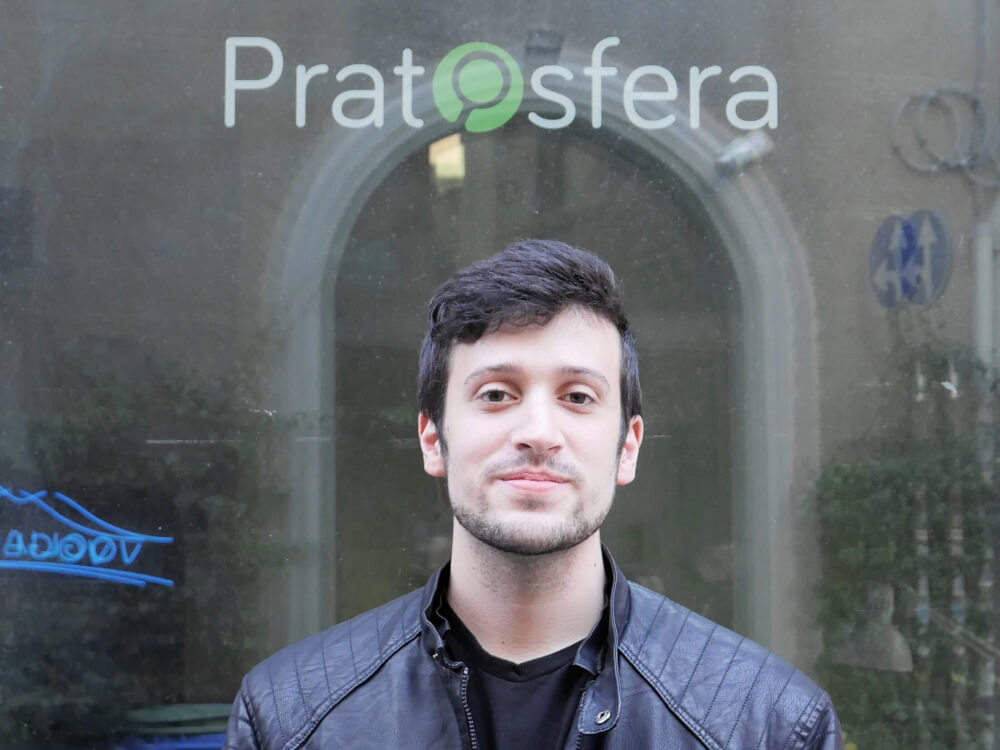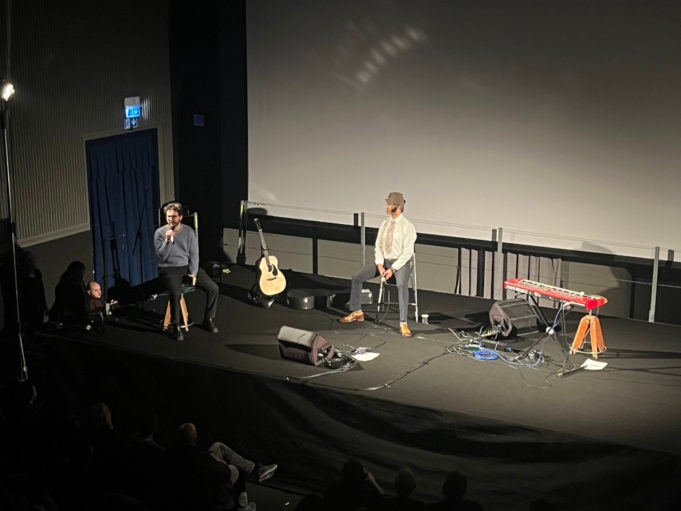Ad oggi, sono a Prato da poco più di un mese. Ho visitato Chinatown, molti musei, e ho avuto la fortuna di provare alcuni dei tanti ristoranti di Prato.
Però, qualcosa che non ho fatto, fino a poco tempo fa, è vivere un evento con la musica dal vivo. Giovedì ho visitato Il Garibaldi per guardare un film screening, seguito da un concerto dal vivo di Fantastic Negrito in cui ha eseguito canzoni dal suo ultimo album “White Jesus Black Problems.” Ero curioso di imparare più di questo evento, quindi ho fatto delle ricerche.
Ho trovato che l’album tratta temi come il razzismo, il capitalismo, la libertà, così come la storia della schiavitù negli Stati Uniti. L’album di Negrito si focalizza sulla storia dei suoi avi (sette generazioni fa) e in particolare di un suo trisavolo schiavo (che lui chiama “Nonno coraggio”) e di sua nonna, scozzese e bianca. Sia nello screening che nella performance dal vivo, lui racconta la storia di come hanno sfidato ogni previsione e le leggi razziste della Virginia per amore dell’amore.
Questo concerto mi ha interessato molto perché è stato il primo evento in lingua inglese in cui sono stato da quando sono arrivato qua. Inoltre, sapendo che il concerto trattava problemi americani come capitalismo, avidità corporativa e razzismo sistemico, quest’evento mi ha dato la possibilità per vedere il modo in cui gli italiani vedono questi problemi.
Quando il film è iniziato, sono stato accolto da scene che ricordavano motivi presenti in tutta la storia americana – più prominente la sua storia di schiavitù e razzismo, ma anche il modo in cui quei temi si manifestano ancora oggi negli Stati Uniti. Questa brutta verità, che a un certo punto nella storia qualcuno si può comprare un altro umano, sembravae ssere collegato con il capitalismo odierno negli Stati Uniti – soprattutto con i signori aziendali e i ricchi uomini bianchi che continuano a trarre profitto dal lavoro fisico e mentale dei neri.
A livello musicale il concerto mi è piaciuto molto ma anche ho apprezzato il modo magistrale in cui Negrito ha usato sia il film che la musica per raccontare la storia dei suoi antenati. Anche se Negrito ha detto che non sa come fare i film, è stato chiaro che ha del talento. Dopo che il film è finito, pensavo inizialmente che la performance lo avrebbe seguito. Però, invece, c’è stata una sessione di domande, che mi ha dato l’opportunita’ di sentire i pensieri della gente di Prato.
Una delle prime domande è stata posta da un membro del pubblico. Qualcuno ha detto «Questa sembra come una storia molto americana … risale a sette generazioni… eppure qui c’è un pubblico internazionale… Secondo te, perchè c’è un pubblico così internazionale interessato a questa storia?». Negrito ha risposto dicendo che «Penso che questa storia sia come Romeo & Juliet… e penso che quella storia trascenda la razza e la cultura… Penso che, anche se è americana nel senso che si occupa della tratta transatlantica degli schiavi, è anche una storia d’amore, ed è una storia di lotta contro ogni avversità, senza chiedere il permesso».
Qualcun’altro ha chiesto «Questa storia è bellissima, ma anche triste, potente, e piena di messaggi. Quando ha fatto l’album, pensavi che alcune persone non avrebbero guardato i dettagli e si sarebbero solo bevute una birra e si sarebbero divertite?».
«Penso che si dovrebbe sempre bere una birra, qualunque cosa accada», ha risposto. Ha poi parlato della sua esperienza nella creazione di musica. Ha detto che si è sempre sentito molto serio con la sua musica quando era più giovane, e che ha sentito molta pressione, ma ora che è
più grande, si sente più libero nel fare musica e suonarla.
Come madrelingua inglese, mi ha colpito il fatto che questa storia venisse raccontata non solo in Italia, ma in tutto il mondo. Inoltre, in qualità di studenti di affari internazionali, questa è stata un’esperienza illuminante poiché ho potuto vedere come gli italiani percepivano e reagivano ai problemi nel mio paese d’origine.
Alla fine, non sono stato solo in grado di sperimentare una bellissima opera d’arte, ma lungo la strada ho trovato un nuovo musicista preferito.

Nei prossimi mesi Samuel Weinmann racconterà Prato dal suo punto di vista. Seguirà concerti, spettacoli e molto altro e poi ne scriverà sia in inglese che in italiano su Pratosfera.
English Version
As of today, I have been in the city of Prato for only a little over a month. I’ve visited Chinatown, some of the city’s many museums and I have been lucky enough to try some of Prato’s diverse array of restaurants.
One thing that I haven’t done–until recently–is experience an event with live music. On Thursday, I visited Il Garibaldi in Prato to see a film screening, followed by an acoustic performance by an American artist named Fantastic Negrito. Curious to see what this event was about, I did a bit of research on the event beforehand, and found that during the concert, he would be performing songs from his 2022 album “White Jesus Black Problems.”
After looking more into Negrito, I found out that his recent album deals with themes like racism, capitalism, freedom as well as the history of slavery in the United States. Negrito’s album focuses on the story of his grandparents seven generations ago–specifically, his enslaved grandfather (whom he calls “Grandfather Courage), and his white Scottish grandmother. In both the screening and the live performance, Negrito tells the story of how they defied all odds and the racist laws of Virginia for the sake of love.
As I have grown used to attending only Italian-language events, this concert was especially interesting for me, as it was the first English-language event that I have been to here. Moreover, knowing that the concert dealt with largely American issues, such as capitalism, corporate greed and systemic racism stemming from slavery was especially interesting for me, as it gave me a chance to see how Italians perceived these issues.
Although I’m aware that these issues are omnipresent throughout the entire world, I found it interesting to see these events discussed in Prato Italy, and I was curious to see how Italians watching the screenplay and the concert would perceive his work. When the film screening started, I was greeted by scenes that were reminiscent of motifs present throughout American history: most prominently its history of slavery and racism, but also the way that those themes still manifest themselves in the United States today. This ugly fact, that human beings were able to be purchased, seemed to be weaved into present-day capitalism, with corporate overlords and rich white men continuing to profit off of the physical and mental labor Black people.
On a purely musical level, I deeply enjoyed the concert, but I also appreciated the masterful way that Negrito used both film and music to tell the story of his ancestors. Despite Negrito saying that he didn’t know how to make movies when he created the film, it was clear that he had a
knack. After the film ended, I initially thought that it would go straight into the acoustic performance. However, a Q&A session followed, giving me the perfect chance to hear what Italian people thought of the film and of these American issues.
One of the first questions asked by a member of the audience was “This looks like a very American story… it goes back seven generations… and yet there is an international audience here… Why do you think there is such an international audience interested in this story?” He responded by saying “I think it’s… like Romeo & Juliet… and I think that story transcends race, culture… I think although it is very American because of the transatlantic slave trafficking, I think it’s also a love story, and it’s a story of fighting against the odds, and it’s a story of not asking permission.”
Someone else asked “This story is so beautiful and sad and powerful, and full of messages. When you made the record, were you thinking that maybe some people would not go inside the details, and maybe only listen to the music, have fun, and have a beer?” “I think you should have a beer. I think no matter what, you should do that…” He said in response. He then elaborated on his experience with making music, and he said that he always felt very serious with his music when he was younger, and that he felt a lot of pressure, but now that he’s older, he feels more free with making music and performing it.
Overall, as a native English speaker, I was very compelled by the fact that this story was being told not only in Italy, but around the world. Additionally, as an international affairs major, this was an enlightening experience as I was able to see how Italians perceived and reacted to issues in my home country. In the end, I wasn’t just able to experience a beautiful piece of art, but I also discovered a new favorite musician along the way.










